八年级英语形容词的比较级和最高级
英语八年级上册第二单元重要语法点

英语八年级上册第二单元重要语法点以下是八年级上册英语第二单元的重要语法点:1. 形容词和副词的比较级和最高级- 比较级:一般在形容词或副词后面加上"-er" 即可,例如"taller"、"quicker"。
- 最高级:一般在形容词或副词后面加上"-est" 即可,例如"tallest"、"quickest"。
- 注意:有些形容词和副词的比较级和最高级不规则,需要单独记忆,例如"good/better/best"。
2. 用"than" 表示比较- 基本句型:A + be/do + 比较级+ than + B,例如"I am taller than you."。
- 可以使用"not as/so + 比较级+ as" 表示"A不如B",例如"He is not as tall as his brother."。
3. 用"the same as" 表示相似- 基本句型:A + be + the same as + B,例如"Their houses are the same as ours."。
4. 用"in" 表示时间或地点- 在时间方面,"in" 表示在某个时间段内,例如"in the morning"、"in 2023"。
- 在地点方面,"in" 表示在某个位置范围内,例如"inBeijing"、"in the school"。
5. 用"on" 表示时间或地点- 在时间方面,"on" 表示在某个具体日期或时间点上,例如"on Monday"、"on my birthday"。
八年级英语比较级和最高级
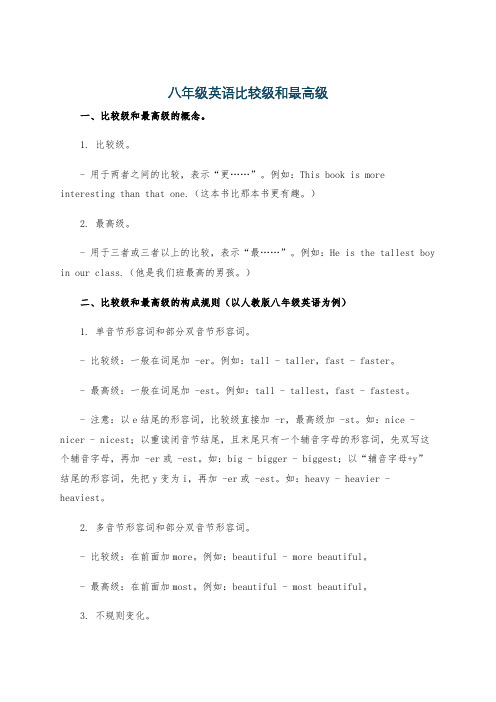
八年级英语比较级和最高级一、比较级和最高级的概念。
1. 比较级。
- 用于两者之间的比较,表示“更……”。
例如:This book is more interesting than that one.(这本书比那本书更有趣。
)2. 最高级。
- 用于三者或三者以上的比较,表示“最……”。
例如:He is the tallest boy in our class.(他是我们班最高的男孩。
)二、比较级和最高级的构成规则(以人教版八年级英语为例)1. 单音节形容词和部分双音节形容词。
- 比较级:一般在词尾加 -er。
例如:tall - taller,fast - faster。
- 最高级:一般在词尾加 -est。
例如:tall - tallest,fast - fastest。
- 注意:以e结尾的形容词,比较级直接加 -r,最高级加 -st。
如:nice - nicer - nicest;以重读闭音节结尾,且末尾只有一个辅音字母的形容词,先双写这个辅音字母,再加 -er或 -est。
如:big - bigger - biggest;以“辅音字母+y”结尾的形容词,先把y变为i,再加 -er或 -est。
如:heavy - heavier - heaviest。
2. 多音节形容词和部分双音节形容词。
- 比较级:在前面加more。
例如:beautiful - more beautiful。
- 最高级:在前面加most。
例如:beautiful - most beautiful。
3. 不规则变化。
- 一些形容词的比较级和最高级有不规则变化。
例如:- good/well - better - best.- bad/badly - worse - worst.- many/much - more - most.- little - less - least.- far - farther/further - farthest/furthest(farther表示距离上更远;further表示程度上更进一步)三、比较级和最高级的用法。
100个七八年级形容词副词的比较级和最高级
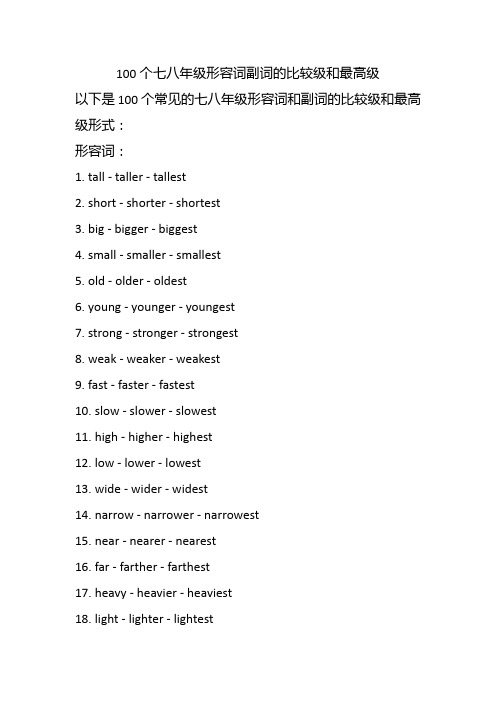
100个七八年级形容词副词的比较级和最高级以下是100个常见的七八年级形容词和副词的比较级和最高级形式:形容词:1. tall - taller - tallest2. short - shorter - shortest3. big - bigger - biggest4. small - smaller - smallest5. old - older - oldest6. young - younger - youngest7. strong - stronger - strongest8. weak - weaker - weakest9. fast - faster - fastest10. slow - slower - slowest11. high - higher - highest12. low - lower - lowest13. wide - wider - widest14. narrow - narrower - narrowest15. near - nearer - nearest16. far - farther - farthest17. heavy - heavier - heaviest18. light - lighter - lightest19. dangerous - more dangerous - most dangerous20. easy - easier - easiest21. busy - busier - busiest22. quiet - quieter - quietest23. beautiful - more beautiful - most beautiful24. delicious - more delicious - most delicious25. expensive - more expensive - most expensive26. cheap - cheaper - cheapest27. hot - hotter - hottest28. cold - colder - coldest29. clean - cleaner - cleanest30. dirty - dirtier - dirtiest31. good - better - best32. bad - worse - worst33. strong - stronger - strongest34. weak - weaker - weakest35. tall - taller - tallest36. short- shorter- shortest37. long- longer- longest38. narrow- narrower- narrowest39. early- earlier- earliest40. late- later- latest41. big- bigger- biggest42. beautiful- more beautiful- most beautiful43. safe- safer- safest44. near- nearer- nearest45. round- rounder- roundest46. thin- thinner- thinnest47. good- better- best48. fast- faster- fastest49. hot- hotter- hottest50. low- lower- lowest51. fat- fatter- fattest52. happy- happier- happiest53 late later latest54 simple simpler simplest55 near nearer nearest56 easy easier easiest57 quiet quiter quitest58 hard harder hardest59 big bigger biggest60 small smaller smallest61 hotter hottest hottest62 cold colder coldest63 thin thinner thinnest64 hard harder hardest65 tall taller tallest66 old older oldest67 new newer newest68 wide wider widest69 long longer longest70 short shorter shortest71 big bigger biggest72 small smaller smallest73 hot hotter hottest74 cold colder coldest75 good better best76 bad worse worst77 beautiful more beautiful most beautiful78 delicious more delicious most delicious79 expensive more expensive most expensive80 cheap cheaper cheapest81 fast faster fastest82 slow slower slowest83 high higher highest84 low lower lowest85 big bigger biggest86 small smaller smallest87 good better best88 bad worse worst89 beautiful more beautiful most beautiful90 delicious more delicious most delicious91 expensive more expensive most expensive92 cheap cheaper cheapest93 fast faster fastest94 slow slower slowest95 high higher highest96 low lower lowest97 big bigger biggest98 small smaller smallest99 good better best100 bad worse worst。
八年级上册英语形容词副词的比较级与最高级

形容词副词的比较级与最高级基础过关一、比较级的定义:大多数的形容词都有三个级别:原级、比较级、最高级。
其中比较级表示“更……”,用于两者之间的比较,用来说明“前者比后者更……”,比较级前面一般用much, even, a little修饰,其中even, much 只能修饰比较级。
比较级的构成:比较级和最高级的构成1)加-er,-est构成比较级和最高级。
单音节形容词和副词以不发音的-e结尾的High higher highest safe safer safest Hard harder hardest late later latest small----smaller----smallest large----larger----largestnew----newer----newest nice----nicer----nicest辅音字母要双写的情况以辅音加-y结尾的情况Big bigger biggest dry drier driest Hot hotter hottest merry merrier merriest Thin thinner thinnest easy easier easiest 1. 写出以下各形容词的比较级和最高级:1. nice ______________________2. fat ____________________3. slow _____________________4. dry ____________________5. happy ____________________6. wet ____________________7. thin ______________________ 8. far ____________________9. early _____________________ 10. careful_________________15. exciting ___________________ 16. busy __________________2. 根据句意,用所括号内所级形容词的比较等级形式填空:1. Mr. Smith is man in this office. (rich)2. Winter is season of the years. (cold)3. This radio is not so as that one. (cheap)4. It is much today than yesterday. (hot)5. She is a little than her classmates. (careful)6. people came to the meeting than last time. (many)7. Which book is , this one or that one? (easy)8. My room is than yours. (small)9. Hainan is from Beijing than Hunan. (far)10. Skating is than swimming. (exciting)11. Jim is than all the others. (honest)12. The higher you climb, the it will be. (cold)13.There are boys than girls in our class. (few)2) 加more, most构成比较级和最高级多音节的形容词由形容词加-ly构成的副词expensive more expensive most expensive slowly more slowly most slowly carefully more carefully most carefully highly more highly most highly 以-ful,-less,-able,-ous,-ive, -ing等结尾的双元音形容词useless more useless most uselessserious more serious most serious分词形容词tired,pleased及glad,often,real, right,wrong等单音节形容词。
人教版八年级英语比较级和最高级的用法总结

比较级和最高级用法总结一、形容词、副词的比较级和最高级的构成规则1. 一般单音节词和少数以-er,-ow结尾的双音节词,比较级在后面加-er,最高级在后面加-est;(1) 单音节词如:small→smaller→smallest short→shorter→shortest tall→taller→tallest great→greater→greatest(2) 双音节词如:clever→cleverer→cleverest narrow→narrower→narrowest2. 以不发音e结尾的单音节词,比较在原级后加-r,最高级在原级后加-st;如:large→larger→largest nice→nicer→nicest able→abler→ablest3. 在重读闭音节(即:辅音+元音+辅音)中,先双写末尾的辅音字母,比较级加-er,最高级加-est;如:big→bigger→biggest hot→hotter→hottest fat→fatter→fattest4. 以“辅音字母+y”结尾的双音节词,把y改为i,比较级加-er,最高级加-est;如:easy→easier→easiest heavy→heavier→heaviest busy→busier→busiest happy→happier→happiest5. 其他双音节词和多音节词,比较级在前面加more,最高级在前面加most;如:beautiful→more beautiful→most beautifuldifferent→more different→most differenteasily→more easily→most easily注意:①形容词最高级前通常必须用定冠词the,副词最高级前可不用。
例句:The Sahara is the biggest desert in the world.②形容词most前面没有the,不表示最高级的含义,只表示"非常"。
(完整版)八上英语常见及各类型形容词比较级最高级总结
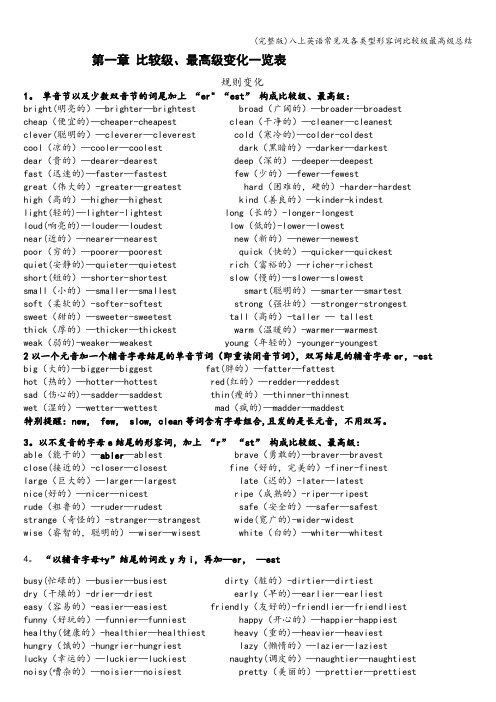
第一章比较级、最高级变化一览表规则变化1。
单音节以及少数双音节的词尾加上“er" “est”构成比较级、最高级:bright(明亮的)—brighter—brightest broad(广阔的)—broader—broadestcheap(便宜的)—cheaper-cheapest clean(干净的)—cleaner—cleanest clever(聪明的)—cleverer—cleverest cold(寒冷的)—colder-coldestcool(凉的)—cooler—coolest dark(黑暗的)—darker—darkestdear(贵的)—dearer-dearest deep(深的)—deeper—deepestfast(迅速的)—faster—fastest few(少的)—fewer—fewestgreat(伟大的)-greater—greatest hard(困难的,硬的)-harder-hardesthigh(高的)—higher—highest kind(善良的)—kinder-kindestlight(轻的)—lighter-lightest long(长的)-longer-longestloud(响亮的)—louder—loudest low(低的)-lower—lowestnear(近的)—nearer—nearest new(新的)—newer—newestpoor(穷的)—poorer—poorest quick(快的)—quicker—quickestquiet(安静的)—quieter—quietest rich(富裕的)—richer-richestshort(短的)—shorter-shortest slow(慢的)—slower—slowestsmall(小的)—smaller—smallest smart(聪明的)—smarter—smartestsoft(柔软的)-softer-softest strong(强壮的)—stronger-strongestsweet(甜的)—sweeter-sweetest tall(高的)-taller — tallest thick(厚的)—thicker—thickest warm(温暖的)-warmer—warmestweak(弱的)-weaker—weakest young(年轻的)-younger-youngest2以一个元音加一个辅音字母结尾的单音节词(即重读闭音节词),双写结尾的辅音字母er,-est big(大的)—bigger—biggest fat(胖的)—fatter—fattesthot(热的)—hotter—hottest red(红的)—redder—reddestsad(伤心的)—sadder—saddest thin(瘦的)—thinner-thinnestwet(湿的)—wetter—wettest mad(疯的)—madder—maddest特别提醒:new, few, slow, clean等词含有字母组合,且发的是长元音,不用双写。
人教版英语八年级上册 比较级最高级归纳
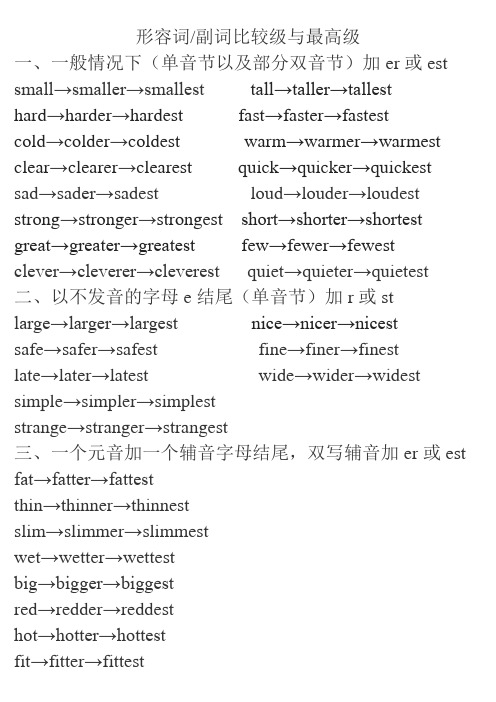
quietly→morequietly→mostquietly
loudly→moreloudly→mostloudly
slowly→moreslowly→mostslowly
quickly→morequickly→mostquickly
sadly→moresadly→mostsadly
happily→morehappily→mosthappily
carefully→morecarefully→mostcarefully
serious→moreserious→mostserious
similar→moresimilar→most similar
lovely→lovelier→loveliest friendly→friendlier→friendliest
五、双音节以及多音节词前加more或most
outgoing→moreoutgoing→mostoutgoing
beautiful→more beautiful→most beautiful
big→bigger→biggest
red→redder→reddest
hot→hotter→hottest
fit→fitter→fittest
四、辅音字母加y结尾,变y为i加er或est
easy→easier→easiestangry→angrier→angriest
busy→busier→busiestheavy→heavier→heaviest
terrible→moreterrible→most terrible
delicious→moredelicious→most delicious
八年级上册英语第四单元语法

八年级上册英语第四单元语法一、形容词的比较级和最高级。
1. 构成规则。
- 一般在词尾加 -er(比较级)和 -est(最高级)。
- 例如:tall - taller - tallest;small - smaller - smallest。
- 以不发音的e结尾的形容词,加 -r和 -st。
- 例如:nice - nicer - nicest;large - larger - largest。
- 以“辅音字母 + y”结尾的形容词,把y变为i,再加 -er和 -est。
- 例如:heavy - heavier - heaviest;busy - busier - busiest。
- 重读闭音节且末尾只有一个辅音字母的形容词,双写这个辅音字母,再加 -er 和 -est。
- 例如:big - bigger - biggest;hot - hotter - hottest。
- 部分双音节和多音节形容词,在前面加more(比较级)和most(最高级)。
- 例如:beautiful - more beautiful - most beautiful;interesting - more interesting - most interesting。
2. 用法。
- 比较级的用法。
- 用于两者之间的比较,表示“更……”。
- 结构:A+be动词/实义动词+形容词比较级+than + B。
- 例如:My sister is taller than me.(我的姐姐比我高。
)- He runs faster than his brother.(他跑得比他哥哥快。
)- 比较级前可以用much, a little, a bit, even等词来修饰,表示程度。
- 例如:This book is much more interesting than that one.(这本书比那本有趣得多。
)- She is a little shorter than her friend.(她比她的朋友矮一点。
初二英语形容词比较级和最高级
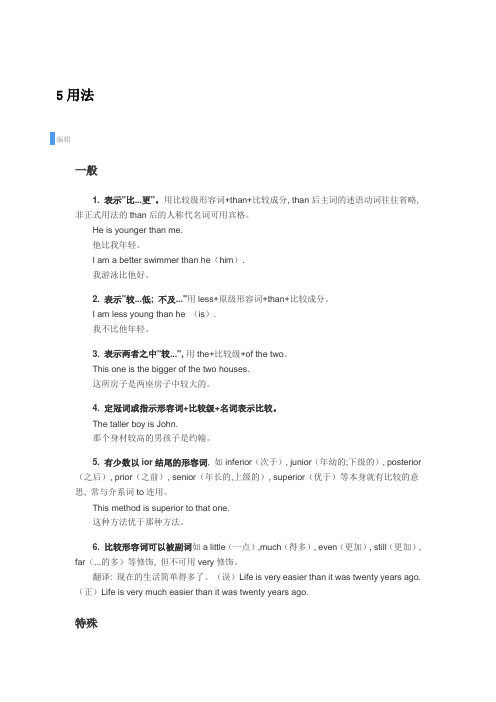
5用法编辑一般1. 表示"比...更"。
用比较级形容词+than+比较成分, than后主词的述语动词往往省略,非正式用法的than后的人称代名词可用宾格。
He is younger than me.他比我年轻。
I am a better swimmer than he(him).我游泳比他好。
2. 表示"较...低; 不及..."用less+原级形容词+than+比较成分。
I am less young than he (is).我不比他年轻。
3. 表示两者之中"较...", 用the+比较级+of the two。
This one is the bigger of the two houses.这所房子是两座房子中较大的。
4. 定冠词或指示形容词+比较级+名词表示比较。
The taller boy is John.那个身材较高的男孩子是约翰。
5. 有少数以ior结尾的形容词, 如inferior(次于), junior(年幼的;下级的), posterior(之后), prior(之前), senior(年长的,上级的), superior(优于)等本身就有比较的意思, 常与介系词to连用。
This method is superior to that one.这种方法优于那种方法。
6. 比较形容词可以被副词如a little(一点),much(得多), even(更加), still(更加),far(...的多)等修饰, 但不可用very修饰。
翻译: 现在的生活简单得多了。
(误)Life is very easier than it was twenty years ago.(正)Life is very much easier than it was twenty years ago.特殊.no more… than… 与……一样不…….not more…than… 没有……那样……,不如…….not less… than… 不亚于……..more than… 不止,仅仅,非常,极其This more than satisfied me. ..more than a little 非常..not more than 不多于no (not any)more than不过,仅仅..no less than 有……之多,多达not less than 至少,不下于..neither more nor less than 恰好,不多不少,简直,和……完全一样..better than 多于,超过It is better than 20 km to the station...(in)less than no time 立即,一会儿..(be)little/no better than 实际上,简直就是..nothing less than 完全是,和……一模一样..all the more 越发,更加..any (the)less 较小/更小一些,小的..all the better 更好,更加.so much the better/worse (for sb./sth.)甚至更好/更坏..go one better (than sb./sth.)胜过……一筹..more…than… 与其说……不如说……..would sooner/rather…than 与其……宁愿..(be)more like…than 不像……倒像..rather…than…/rather than 宁可……而不..other than 除了……,除……之外..rather…than otherwise 不是别的而是..no/none other than 正是,除……之外无其他..no more 不再,不复存在,也不,也没有..less than 不……..more often than no 经常,多半..see more/less of someone 更常/少见;再/少见到……..none + the + 比较级毫不……,毫无…….have seen better days 情况转坏..think better of sth. 改变……的念头..for better or (for)worse 无论好坏,同甘共苦..all the better 因……而更加..more than meets the eye/ear 另有隐情,并非表面那么简单的..More is meant than, meets the ear. 意在言外..There is more (to it )than meets the eyes. 现象背后有文章..the+比较级……,the+比较级……. 越……,越…….无比较级单词编辑.表示国籍的形容词没有比较级和最高级..例如:Chinese(中国的),English(英国的),Japanese(日本的)等等..表示方位和时间的形容词没有比较级和最高级..例如:east(东边的,东方的),west(西边的,西方的)past(过去的)等等..表示绝对概念的词和已达极限的形容词没有比较级和最高级..例如:perfect(完美的),blind(瞎的),dead(死的)等等..说明物体材质和形状的形容词没有比较级和最高级..例如:solid(固体的),round(圆形的),plastic(塑料的)等等..表示数字、顺序或者时间的形容词没有比较级和最高级..例如:next(下一个),several(若干的),daily(每天的)等等..在语法上做表语的表示状态的形容词没有比较级和最高级..例如:alone(孤独的),awake(醒来的),alive(活着的)等等..本身就有比较级含义的形容词没有比较级和最高级.例如:junior(年少的),minor(次要的),superior(上等的)等等.同样,此类词汇的另一个特点是:不能用表示程度的副词如(very ,so)等等来修饰.例如:very dead, so awake是错误的基本句型编辑同级比较.由“...as + 形容词原型+ as...”或“...as + 形容词+ 名词+ as...”构成。
人教版丨八年级上册英语主要语法——形容词比较级和最高级
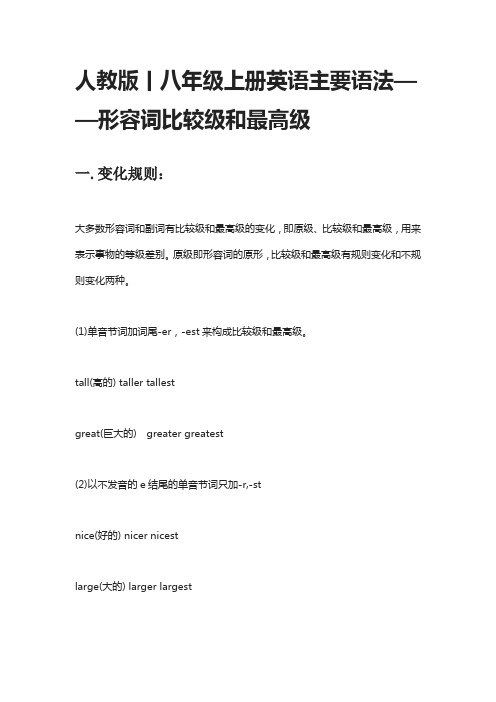
人教版丨八年级上册英语主要语法——形容词比较级和最高级一.变化规则:大多数形容词和副词有比较级和最高级的变化,即原级、比较级和最高级,用来表示事物的等级差别。
原级即形容词的原形,比较级和最高级有规则变化和不规则变化两种。
(1)单音节词加词尾-er,-est来构成比较级和最高级。
tall(高的) taller tallestgreat(巨大的) greater greatest(2)以不发音的e结尾的单音节词只加-r,-stnice(好的) nicer nicestlarge(大的) larger largestable(有能力的) abler ablest(3)以一个辅音字母结尾的闭音节单音节词,双写结尾的辅音字母,再加-er,-est big(大的) bigger biggesthot热的) hotter hottestred红色的redder reddest(4)"以辅音字母+y"结尾的双音节词,改y为i,再加-er,-esteasy(容易的) easier easiestbusy(忙的) busier busiest(5)以ly结尾的副词,除early-earlier-earliest,其他都是加more most. Slowly-more slowly-most slowlyBravely-more bravely-most bravelyquickly-more quickly-most quickly(6)少数以-er,-ow结尾的双音节词未尾加-er,-estclever(聪明的) cleverer cleverestnarrow(窄的) narrower narrowest(7)其他双音节词和多音节词在前面加more,most来构成比较级和最高级。
如:important(重要的) more important most importanteasily(容易地) more easily most easily(8)一些词的比较级和最高级,可以加-er或-est,也可以加more或most,如:clever, polite等。
初二英语语法复习-形容词和副词的比较级和最高级

初二英语语法复习:形容词和副词的比较级和最高级为您整理了,和您一起探讨和学习英语!形容词和副词的比较级和最高级1.比较级:句子表示两者之间的比较时用比较级,其标志词是than, much, a little , even和still等。
① Her hair is much longer than mine. 她的头发比我的长多了。
② I'm a little older than you. 我比你大一点儿。
2.最高级:句子表示三者或多者的比较时用最高级,其标志词是表示范围的in…或of …介词短语。
在句子中,形容词最高级前必须加the。
① The boy is the tallest in our class. 这个男孩是我们班最高的。
② Which is the biggest, the sun, the moon or the earth?★形容词的比较级和最高级:形容词有三种等级:原级、比较级、最高级。
3.原级:句中只有一者时用原级,其标志词是very, so, too, quite等。
His handwriting is very good.他的书法很好。
(一个人不作比较。
)★形容词比较级和最高级的构成:1.一般在原级后加er 构成比较级,加est构成最高级。
small smaller smallestyoung younger youngest2.以不发音的字母e 结尾的形容词,直接加r 或st 构成比较级和最高级。
nice nicer nicestlate later latest3.以辅音字母+y 结尾的形容词,变y为i ,再加er 或est, 构成比较级和最高级。
busy busier busiestheavy heavier heaviest4.在重读闭音节中,末尾只有一个辅音字母的形容词,要先双写这个辅音字母,再加er或est,构成比较级和最高级。
hot hotter hottestbig bigger biggest5.个别形容词的比较级和最高级是不规则变化,需个别记忆。
(完整)八年级英语上形容词比较级最高级
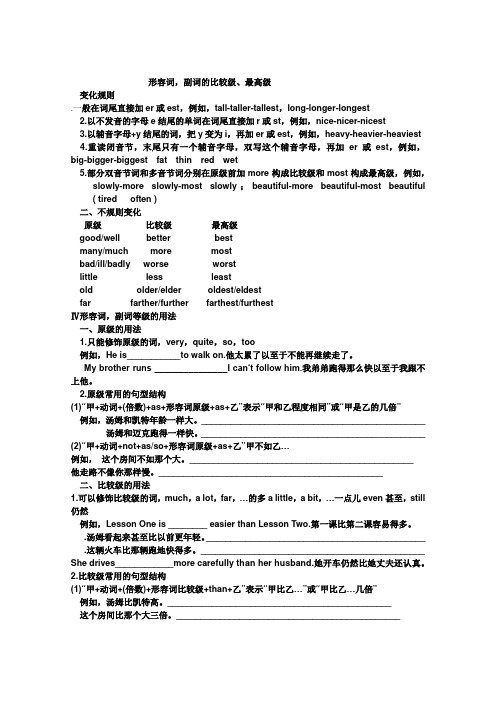
形容词,副词的比较级、最高级变化规则.一般在词尾直接加er或est,例如,tall-taller-tallest,long-longer-longest2.以不发音的字母e结尾的单词在词尾直接加r或st,例如,nice-nicer-nicest3.以辅音字母+y结尾的词,把y变为i,再加er或est,例如,heavy-heavier-heaviest4.重读闭音节,末尾只有一个辅音字母,双写这个辅音字母,再加er或est,例如,big-bigger-biggest fat thin red wet5.部分双音节词和多音节词分别在原级前加more构成比较级和most构成最高级,例如,slowly-more slowly-most slowly;beautiful-more beautiful-most beautiful ( tired often )二、不规则变化原级比较级最高级good/well better bestmany/much more mostbad/ill/badly worse worstlittle less leastold older/elder oldest/eldestfar farther/further farthest/furthestⅣ形容词,副词等级的用法一、原级的用法1.只能修饰原级的词,very,quite,so,too例如,He is___________to walk on.他太累了以至于不能再继续走了。
My brother runs _______________I can‘t follow him.我弟弟跑得那么快以至于我跟不上他。
2.原级常用的句型结构(1)“甲+动词+(倍数)+as+形容词原级+as+乙”表示“甲和乙程度相同”或“甲是乙的几倍”例如,汤姆和凯特年龄一样大。
______________________________________________ 汤姆和迈克跑得一样快。
八年级上册英语语法《形容词的比较级和最高级》知识点

八年级上册英语语法《形容词的比较级和最高级》知识点形容词的比较级和最高级一、比较级的定义:大多数的形容词都有三个级别:原级、比较级、最高级。
其中比较级表示“更……”,用于两者之间的比较,用来说明“前者比后者更……”,比较级前面一般用much, even, a little修饰,其中even, much只能修饰比较级。
二、比较级的构成:(1)规则变化:①单音节和部分双音节的形容词一般在词尾加-erEg: calm---XXX---XXX---smarter②以字母e结尾的直接在词尾加-rEg: nice---nicerfine---finerlarge---larger③以“辅音+y结尾的词,变y为i,再加-er”Eg: early---XXX---happierbusy---XXX④以重读闭音节的单个子音字母结尾的词,双写子音字母,再加-erEg: big---XXX---XXX---XXX⑤多音节或部分双音节的形容词在原级前面加moreEg: popular---more popularimportant---more important(2)不划定规矩变革:少数形容词的比较级变化是不规则的:good---XXX/ill---worsemany/much---morelittle---lessfar---XXX---older/elder三、比力级的用法:(一)当两小我或事物(A和B)举行比力时,我们需要用到描述词(副词)的原级或者比力级1.表达“A和B一样”,用as…as的结构。
公式: A+be动词+as+描述词原级+as…+BA+实义动词+as+副词原级+as…+BEg:I am as tall as you.我和你一样高。
He runs as fast as I.他跑得和我一样快。
2.表达“A不如B”用not as…as的结构。
公式: A+be动词的否定形式+as+形容词原级+as…+BA+助词的否定形式+动词+as+形容词原级+as…+BEg:I am not as tall as you.我没有你高。
八年级比较级最高级知识点
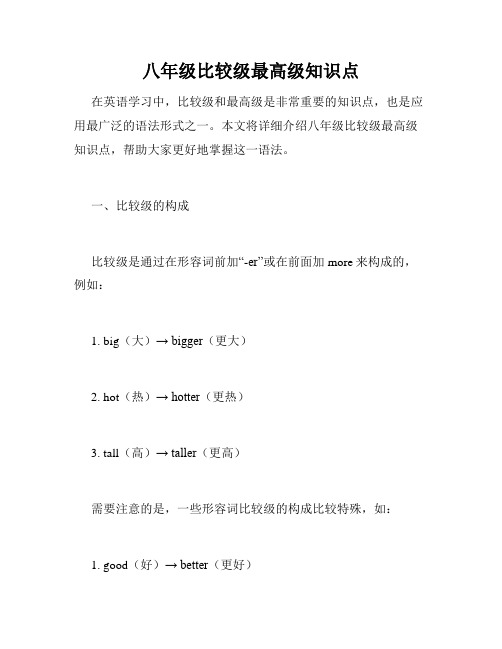
八年级比较级最高级知识点在英语学习中,比较级和最高级是非常重要的知识点,也是应用最广泛的语法形式之一。
本文将详细介绍八年级比较级最高级知识点,帮助大家更好地掌握这一语法。
一、比较级的构成比较级是通过在形容词前加“-er”或在前面加more来构成的,例如:1. big(大)→ bigger(更大)2. hot(热)→ hotter(更热)3. tall(高)→ taller(更高)需要注意的是,一些形容词比较级的构成比较特殊,如:1. good(好)→ better(更好)2. bad(坏)→ worse(更坏)3. many/much(多)→ more(更多)二、最高级的构成最高级是通过在形容词前加“-est”或在前面加most来构成的,例如:1. big(大)→ biggest(最大的)2. hot(热)→ hottest(最热的)3. tall(高)→ tallest(最高的)需要注意的是,一些形容词最高级的构成比较特殊,如:1. good(好)→ best(最好的)2. bad(坏)→ worst(最坏的)3. many/much(多)→ most(最多的)三、比较级和最高级的用法1. 比较级的用法(1)比较两个人或物的情况:例如:He is taller than his sister.(他比他妹妹高。
)My house is bigger than yours.(我的房子比你的大。
)(2)表示一个人或物的性质比另一个人或物更强的情况:例如:John is more intelligent than Tom.(约翰比汤姆更聪明。
)The coffee is hotter than the tea.(咖啡比茶更热。
)2. 最高级的用法(1)表示三个以上人或物中某一个的特定性质:例如:She is the tallest of the three girls.(她是三个女孩中最高的一个。
)This is the most beautiful painting in the exhibition.(这是展览中最美的画。
八年级比较级

形容词的比较级级最高级一形容词或副词的比较级及最高级的构成规则:1.单音节词及部分双音节词(以-y结尾的形容词):○1一般在词末加+-er,-est○2.以辅音字母+y 结尾的词,y变i +-er -est 例:heavy heavier heaviest○3以e 结尾的形容词,直接在末尾+-r -st 例:fine finer finest ○4.以辅元辅,前无元结尾的形容词(重读闭音节),先双写末尾字母再加-er -est。
例:big bigger biggest1.大部分双音节词及多音节词在前加more ,most。
例:beautiful more beautiful most beautifulfriendly more friendly most friendly3 部分形容词的比较级,最高级不规则:需特殊记忆两多(much;many)两好(good;well)两坏(bad;badly)一少little 一老一远(far)完成下列形容词比较级的变换1funny (比较级)________ 2outgoing (比较级)_________3smart (比较级)_______4friendly(比较级)_____ 5.athletic (比较级)________ 6.thin(比较级)___________7.clever(比较级)_______ 8 good(比较级)________ 9big (比较级)___________10wild (比较级)________11 large(比较级)__________ 12 many(比较级)________-二句型表示两者之间比较的句型句型一A+动词+形容词(副词)的比较级+ than+B 表示A比B 更…形容词比较级的标志词:than A or B of the two ….例:○1.Tom is taller than I am/I/ me 。
人教版英语八年级上册比较级最高级归纳
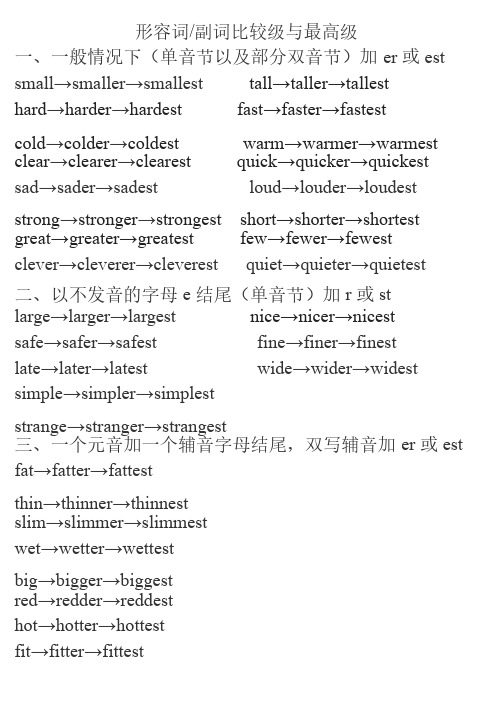
形容词/副词比较级与最高级一、一般情况下(单音节以及部分双音节)加er或est small→smaller→smallest tall→taller→tallesthard→harder→hardest fast→faster→fastest cold→colder→coldest warm→warmer→warmest clear→clearer→clearest quick→quicker→quickest sad→sad er→sadest loud→louder→loudest strong→stronger→strongest short→shorter→shortest great→greater→greatest few→fewer→fewest clever→cleverer→cleverest quiet→quieter→quietest 二、以不发音的字母e结尾(单音节)加r或st large→larger→largest nice→nicer→nicestsafe→safer→safest fine→finer→finest late→later→latest wide→wider→widest simple→simpler→simplest strange→stranger→strangest 三、一个元音加一个辅音字母结尾,双写辅音加er或est fat→fatter→fattest thin→thinner→thinnest slim→slimmer→slimmest wet→wetter→wettest big→bigger→biggest red→redder→reddest hot→hotter→hottestfit→fitter→fittest 四、辅音字母加y结尾,变y为i加er或est easy→easier→easiest angry→angrier→angriest busy→busier→busiest heavy→heavier→heaviest hungry→hungrier→hungriest crazy→crazier→craziest happy→happier→happiest early→earlier→earliest dirty→dirtier→dirtiest lucky→luckier→luckiestshy→shier→shiest funny→funnier→funniest lovely→lovelier→loveliest friendly→friendlier→friendliest 五、双音节以及多音节词前加more或most outgoing→more outgoing→most outgoing beautiful→more beautiful→most beautifuldifferent→more different→most differentquietly→more quietly→most quietly loudly→more loudly→most loudly slowly→more slowly→mo st slowly quickly→more quickly→mo st quickly sadly→more sadly→mo st sadly happily→more happily→mo st happily carefully→more carefully→mo st carefully serious→more serious→most serious →mo st similar similar→more similar→moeasily easily→more easily→most e asily clearly→more clearly→mo st clearly bored→more bored→mo st bored talented→more talented→mo st talented boring→more boring→mo st boring →mo st popular popular→more popular→moterrible→more terrible→mo st terrible delicious→more delicious→mo st delicious →mo st different different→more different→mo→mo st difficult difficult→more difficult→mo→mo st beautiful beautiful→more beautiful→moexpensive→more expensive→mo st expensive necessary→more necessary→mo st necessary →mo st important important→more important→mo→mo st wonderful wonderful→more wonderful→mocomfortable→more comfortable→mo st comfortable hardworking→more hardworking→mo st hardworking 不规则adj、adv比较级、最高级good/well→better→best bad/badly/ill→worse→worst many/much→more→most few/little→less→least old→older/elder→oldest/eldest far→farther/further→farthest/furthest 无比较级的adj/adv fantastic excellent favorite true(ly) false right wrong full empty round square possible impossible 。
八年级上比较级和最高级的用法

• Who wants to go to _t_h_e_f_ar_th_e_s_t_ park?
放映结束 感谢各位的批评指导!
谢 谢!
让我们共同进步
48kg
Lin Xinru is thin.
45kg
Liu Yifei is thinner.
Liu Yifei is thinner than Lin Xinru.
outgoing
more outgoing
Cheng Long is outgoing.
Li Yong is more outgoing. Li Yong is more outgoing than Cheng long.
• 3 She is much s_h_o_r_t_e_r than her brother. <short>
• 4 This picture is _m_o__re__b_e_a_u_t_if_u_l than that • one .<beautiful>
• 5 Which is _b_i_g_g_e_r,the sun or the moon?<bigth>e cleverer
Zeng Zhiwei is short. Pang Changjiang isshorter. Pang Changjiang is shorter than Zeng Zhiwei.
80kg
90kg
Liu Huan is heavy .
Fei Mao is heavier .
Fei Mao is heavier than Liu Huan.
Jim
Tom
Jim is athletic.
- 1、下载文档前请自行甄别文档内容的完整性,平台不提供额外的编辑、内容补充、找答案等附加服务。
- 2、"仅部分预览"的文档,不可在线预览部分如存在完整性等问题,可反馈申请退款(可完整预览的文档不适用该条件!)。
- 3、如文档侵犯您的权益,请联系客服反馈,我们会尽快为您处理(人工客服工作时间:9:00-18:30)。
八年级英语形容词的比较级和最高级
一、比较级的定义:大多数的形容词都有三个级别:原级、比较级、最高级。
其中比较级表示“更……”,用于两者之间的比较,用来说明“前者比后者更……”,比较级前面一般用much, even, a little修饰,其中even, much 只能修饰比较级。
二、比较级的构成:
(1)规则变化:
①单音节和部分双音节的形容词一般在词尾加-er
Eg: calm---calmer tall---taller smart---smarter
②以字母e结尾的直接在词尾加-r
Eg: nice---nicer fine---finer large---larger
③以“辅音+y 结尾的词,变y为i,再加-er”
Eg: early---earlier happy---happier busy---busier
④以重读闭音节的单个辅音字母结尾的词,双写辅音字母,再加-er
Eg: big---bigger thin---thinner hot---hotter
⑤多音节或部分双音节的形容词在原级前面加more
Eg: popular---more popular important---more important
(2)不规则变化:
少数形容词的比较级变化是不规则的:good---better bad/ill---worse
many/much---more
little---less far---farther/further old---older/elder
三、比较级的用法:
(一)当两个人或事物(A和B)进行比较时,我们需要用到形容词(副词)的原级或者比较级
1.表达“A和B一样”,用as…as的结构。
公式: A+be动词+as+形容词原级+as…+B
A+实义动词+as+副词原级+as…+B
Eg I am as tall as you.我和你一样高。
He runs as fast as I. 他跑得和我一样快。
2.表达“A不如B”用not as…as的结构。
公式: A+be动词的否定形式+as+形容词原级+as…+B
A+助词的否定形式+动词+as+形容词原级+as…+B
Eg I am not as tall as you.我没有你高。
He doesn’t run as fast as I. 他没有我跑得快。
2.表达“A大于B”用“比较级+than”的结构。
公式: A+be动词+形容词比较级+than+B…
A+实义动词+副词比较级+than+B…
Eg I am taller than you.我比你高。
He runs faster than I. 他跑得比我快。
(二)关于形容词、副词比较级的更多用法
1.比较级前面可以加上表示“优劣程度”的词或短语,意思是“更…”,“…得…”。
常见词有much, a little, even, a lot, a great deal等。
Eg He is much taller than I.他比我要高得多。
I jump a little higher than he.我跳得比他高一点点。
想一想,这些词能修饰形容词或副词的原级吗?
2.比较级前面可以加上表示具体数量差别的结构,表示具体“大多少”,“小多少”,“长多少”,“短多少”等。
Eg I am two years older than he.我比他大两岁。
This building is 20 meters higher than that one.
3.“比较级+and+比较级”表示“越来越……”。
It is getting warmer and warmer.天气越来越暖和。
He is running faster and faster.他跑得越来越快。
0ur country is becoming more and more beautiful.我们祖国越来越美了。
4.“the more…,the more…”表示“越……,就越……”,
The more,the better.多多益善。
The more careful you are,the fewer mistakes you will make.你越细心,犯错就越少。
5.“the more…of the two…”表示“两个当中较。
的一个”
The taller of the two boys is my brother.
四、当三个或三个以上的人或事物进行比较时,我们需要用到形容词(副词)的最高级
1.表达“…是…中最…的”,用“the+形容词(副词)的最高级”的结构。
后面可以加上表示范围的介词短语或从句。
公式a.主语+be动词+the +形容词最高级+(名词)+表示范围的介词短语或从句
b.主语+实义动词+(the)+形容词最高级+表示范围的介词短语或从句
Eg He is the tallest (student) in our class.
He jumps the highest of the three boys.
This is the best book that I have ever read.
2.表示“最…的…中一个”,用“one of +the +最高级+复数名词”的结构来表达。
Eg He is one of the best students in our class.他是我们班最好的学生之一。
This is one of the most beautiful flowers in the garden.这是花园里最漂亮的花之。
注意:(一) 形容词的最高级前面有定冠词the , 而副词的最高级前面定冠词the可以省略。
但在形容词最高级前有物主代词时,不能要定冠词the.
(二)常见的用来表示范围的介词有in, of, among
五、运用形容词、副词比较级应当注意的问题:
(一)、按语法规则,than后面的人称代词应当用主格,但口语当中有时会用宾格代替
主格。
Eg He is more careful than I (me).
(二)、只有同类的事物才能比较
e.g 1. Her bag is bigger than mine. 不能说Her bag is bigger than I.
2.The weather of Kunming is much better than that of Shenyang. 不能说The weather of Kunming is much better than Shenyang.。
